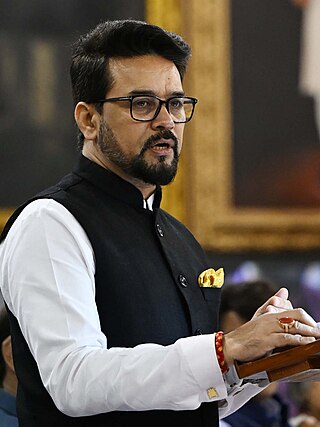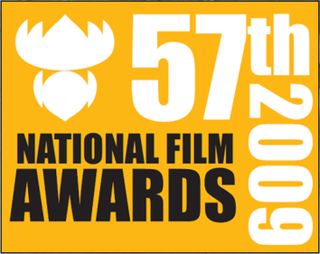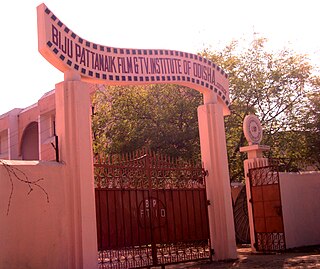Subrata Mitra was an Indian cinematographer. Acclaimed for his work in The Apu Trilogy (1955–1959), Mitra often is considered one of the greatest Indian cinematographers.

Ministry of Information and Broadcasting is a ministerial level agency of the Government of India responsible for the formulation and administration of rules, regulations and laws in the areas of information, broadcasting, the press and the Cinema of India.

Bharatendu Academy of Dramatic Arts or Bharatendu Natya Akademi is a theatre training institute in Lucknow, India. It is named after Bharatendu Harishchandra, father of Hindi theatre. It offers a two-year full-time diploma course in theatre training. It is an autonomous organisation under the Ministry of Culture, Government of Uttar Pradesh.

Ashoke Viswanathan is a Bengali Indian filmmaker and theatre personality, based in Kolkata, India.

Satyajit Ray was an Indian director, screenwriter, documentary filmmaker, author, essayist, lyricist, magazine editor, illustrator, calligrapher, and composer. Ray is widely considered one of the greatest and most influential film directors in the history of cinema. He is celebrated for works including The Apu Trilogy (1955–1959), The Music Room (1958), The Big City (1963) and Charulata (1964) and the Goopy–Bagha trilogy.

Cinema of West Bengal, also known as Tollywood or Bengali cinema, is an Indian film industry of Bengali-language motion pictures. It is based in the Tollygunge region of Kolkata, West Bengal, India. The origins of the nickname Tollywood, a portmanteau of the words Tollygunge and Hollywood, dates back to 1932. It was a historically important film industry, at one time the centre of Indian film production. The Bengali film industry is known for producing many of Indian cinema's most critically acclaimed global Parallel Cinema and art films, with several of its filmmakers gaining prominence at the Indian National Film Awards as well as international acclaim.
Dr. Bhupen Hazarika Regional Government Film and Television Institute, formerly known as the Jyoti Chitraban Film and Television Institute, is the only government-owned film institute in northeastern India located at Sila, Changsari in Assam. It was named after Jyoti Prasad Agarwala, the first Assamese film director and producer. The Jyoti Chitraban Film Studio was established in the year of 1961 by the Government of Assam. The Film Institute was set up at the same Studio premises using the same infrastructure in the year 1999.

Dibakar Banerjee is an Indian film director, screenwriter, producer and advertisement-filmmaker known for his work in Hindi films. Banerjee started his career in advertising, being a feature filmmaker, he still continues to be an ad-filmmaker. He also runs his own film production company, Dibakar Banerjee Productions.

Love Sex Aur Dhokha is a 2010 Indian Hindi-language anthology found footage drama film directed by Dibakar Banerjee and written by Banerjee and Kanu Behl. Jointly produced by Ekta Kapoor, Shobha Kapoor and Priya Sreedharan under the banner of ALT Entertainment, the film stars mostly newcomers including Anshuman Jha, Nushrat Bharucha, Rajkummar Rao, Neha Chauhan, Amit Sial, Herry Tangri and Ashish Sharma. It has three separate but interlinked stories about an honour killing, an MMS scandal and sting operations.

The 57th National Film Awards, presented by Directorate of Film Festivals, the organisation set up by Ministry of Information and Broadcasting, India to felicitate the best of Indian Cinema released in the year 2009.

The International Film Festival of India (IFFI), founded in 1952, is one of the film festivals in Asia. Held annually, currently in the state of Goa, on the western coast of the country, the festival aims at providing a common platform for the cinemas of the world to project the excellence of the film art; contributing to the understanding and appreciation of film cultures of different nations in the context of their social and cultural ethos, and promoting friendship and cooperation among people of the world. The festival is conducted jointly by the National Film Development Corporation of India and the state Government of Goa.
Sagar Ballary is an Indian film director, most known for his films, like Bheja Fry (2007), Bheja Fry 2 (2011) and Bhatukli (Marathi) (2014).
The 38th National Film Awards, presented by Directorate of Film Festivals, the organisation set up by Ministry of Information and Broadcasting, India to felicitate the best of Indian Cinema released in the year 1990. Ceremony took place in 1991.
Kanu Behl is an Indian film director and screenwriter. He is known for his work in Hindi cinema.
Namrata Rao is an Indian film editor, who works in Hindi cinema, where starting with Oye Lucky! Lucky Oye! (2008), she edited films like Ishqiya (2010), Band Baaja Baaraat (2010), Ladies vs Ricky Bahl (2011) and Kahaani (2012). She is most famous for editing and acting in the film Love Sex Aur Dhokha (2010) for which she received the Filmfare Award for Best Editing in 2011. She received National Film Award for Best Editing and Filmfare Award for Best Editing for the critically acclaimed Kahaani (2012).
The M.G.R. Government Film and Television Training Institute, formerly known as the Adyar Film Institute, is Asia's first-ever film and television training institute. Established in 1945 as Adyar Film Institute, it is one of the pioneer film institutes in India, It is in Tharamani, Chennai, and is run by the Tamil Nadu State Government under the Department of Information and Public Relations.

Vipin Vijay is an Indian film director and screenwriter. He received his post-graduate degree in filmmaking from the Satyajit Ray Film and Television Institute SRFTI, Calcutta. He received the Charles Wallace Arts Award for research at the British Film Institute, London, 2003. Vipin is the recipient of "The Sanskriti Award" (2007) for social & cultural achievement. His works are made under independent codes and defy any categorisation eluding all traditional genre definitions and merge experimental film, documentary, essay, fiction all into one.

The Biju Pattanaik Film and Television Institute of Odisha, Cuttack (BPFTIO) is an autonomous college established by the Government of Odisha under World Bank assisted scheme to meet the emerging demand of well trained technical manpower in the field of television network and film production activities. Situated on the bank of river Mahanadi, BPFTIO occupies an independent space in the sprawling campus of Bhubanananda Orissa School of Engineering (BOSE), Cuttack the oldest Engineering School of the State. Funded by Government of Odisha, Department of Employment and Technical Education & Training, the institute offers diploma courses in 3 disciplines such as Cinematography, Sound & TV. Engineering and Film & Video Editing.

K. R. Narayanan National Institute of Visual Science and Arts (KRNNIVSA) is an autonomous institute established by the Government of Kerala at Thekkumthala, Chengalam East Village in Kottayam District of Kerala state as a training-cum-research centre in film/audio-visual technology. The institute, named after K. R. Narayanan who was the President of India during 1997 - 2002, was inaugurated by Hamid Ansari, Vice President of India, on 11 January 2016. The Institute is managed by a Governing Council which has Chief Minister of Kerala as Chairman and Minister for Education, Kerala State, as Co-Chairman and twelve members. There is also an Academic Council consisting of people for the film and television industry.

Shehnad Jalal is a cinematographer based in Kerala, India. He made his debut as a Cinematographer in the film Chitrasutram. The film won him the Kerala State Film Award for Best Cinematography in the year 2010. The documentary, A Pestering Journey won him the Navaroze Contractor Award for the Best Documentary Cameraman at the 4th International Documentary and Short Film Festival of Kerala, 2011., He won a nomination for Achievement in Cinematography at the Asia Pacific Screen Awards 2017, for his work in the movie Loktak Lairembee (film) in the Meitei language, directed by Haobam Paban Kumar. The film had its world premiere at the Busan International Film Festival 2016 in the New Currents and was selected for the Berlinale FORUM 2017. The film won the Golden Gateway award for Best Film at the Mumbai International Film Festival 2016 and the National Award for the Best Indian Film on Environment Conservation, 2016. Shehnad Jalal is a member of the Indian Society of Cinematographers (ISC).















